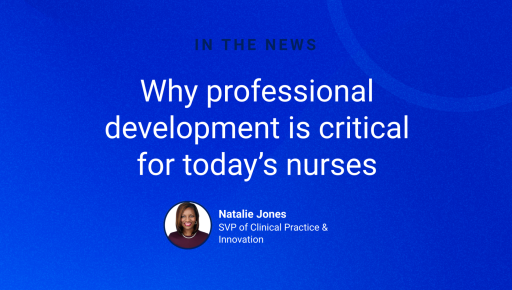Registered nurses (RNs) make up the largest group of employees within the healthcare system, with nearly 5.2 million working in the United States. Because RNs are continuously in high demand, with a projected job growth rate of 6% through 2032, it’s a position that is as attractive as it is rewarding.
But what do RNs actually do? This post takes a closer look at registered nurses, including their job responsibilities, where they work, and much more.
What is a registered nurse?
A registered nurse is someone who provides and coordinates patient care, supporting physicians and other medical professionals in a variety of settings. RNs also communicate with family members about patient progress while educating patients on follow-up care.
They perform a number of daily tasks depending on where they work. These can include:
- Creating a care plan
- Dressing wounds
- Administering medications
- Preparing patients for discharge
- Monitoring vital signs
- Drawing blood, urine samples, etc.
- Documenting patient information
- Inserting IV catheters
- Educating patients and families about illnesses and treatments
RNs are focused on assessing the patient, helping to identify their critical needs, and creating care plans that meet those needs. Most of the time, registered nurses will report to a nursing manager or the physician in charge of the patient’s care.
RNs can also supervise licensed practical nurses, certified nursing assistants, licensed vocational nurses, and nursing students. As a registered nurse, you’d be able to work in a number of settings. These include:
- Long-term care facilities
- Intensive care units
- Outpatient clinics
- Schools
- Physicians’ offices
- Home healthcare service
Sometimes, large corporations also employ RNs to remain on the business premises. Because of this wide array of possible settings, RNs have a chance to work with many different types of patients.

Despite the variety of positions and responsibilities RNs have, there is one process that all registered nurses follow for patient care. It’s made up of the following five steps:
- Assessment: Collecting and assessing patient data (physiological, sociocultural, etc.)
- Diagnosis: Clinically judging actual or potential health needs
- Outcome and planning: Using the above findings to create a care plan
- Implementation: Documenting the plan to ensure continuity of care
- Evaluation: Assessing the patient’s response to the care plan
Of course, it’s important to remember that even a thorough care plan can require tweaks along the way. That’s why you should continue making changes to the plan as necessary to ensure you’re adhering to the patient’s needs and providing proper care.
Skills a registered nurse needs
First and foremost, an RN needs to have a passion for helping others. The job is demanding, so feeling the need to help is essential. Besides that, however, there are many other skills an RN needs to have.
Technical skills
One important type of expertise every RN needs is technical skills, such as knowing how to check and monitor vital signs. As an RN, you also have to learn how to check blood pressure, temperature, heart rate, and respiration rate. In addition, you must know what the normal ranges are for each type of patient.
As an RN, you must possess patient safety and well-being skills as well. You should, for example, be able to get patients from their beds to the bathroom, as well as perform basic care duties like wound dressing, drawing blood, and inserting a catheter.
It’s essential that an RN be comfortable with technology, too. You have to be able to check electronic patient records and use a variety of other programs.
Administering medication is another significant part of a registered nurse’s duties, so knowing how to do so accurately is essential. It’s imperative that you are able to identify medications and understand what they do.
Workplace skills
One of the most important skills that a registered nurse needs is communication capabilities. You’ll be interacting and working with others the entire day, including other nurses and physicians, in addition to patients and their families.
The patients you’ll be speaking with could be in pain, nervous, scared, or feeling a number of other emotions. For that reason, you need to know how to stay calm even when others are worked up. You have to be able to listen and explain things clearly. It’s also important to understand body language since that can tell you a lot about what patients are feeling.
RNs need to be flexible as well. Situations can change quickly, especially in ICUs and other emergency settings. You have to be ready to respond to any problem that arises, even when dealing with high-stress situations.
Another crucial skill is leadership. As an RN, you may be responsible for managing less experienced nurses and other coworkers. Being able to collaborate and be part of a team is essential, too, because you’ll be working with physicians and many other healthcare professionals on a daily basis.

How to become a registered nurse
To become a registered nurse, there are a few key steps you have to take.
Earn your degree
The first step to becoming a registered nurse is earning a degree from an accredited institution. In some states, it’s enough to get an associate’s degree in nursing. But recently, more states have been requiring at least a bachelor's degree in nursing (BSN). For the majority of people, earning your BSN is the best way forward.
Pass the NCLEX
Next, you’ll have to pass the National Council Licensure Examination for Registered Nurses (NCLEX). This exam tests your knowledge in key areas of the nursing field so that you’ll be ready to take on a position. You have to pass this exam to obtain your state license.
If you don’t pass the NCLEX the first time, you have to wait 45 days to take it again. Usually, you can take the exam up to eight times a year with 45-day breaks in between.
Obtain state licensure
Once you’ve passed the NCLEX, you have to obtain a nursing license in the state in which you’ll work. Each state has its own requirements, so you’ll need to check with the right board to know exactly what you need to do. Once you have your state license, you’re officially a registered nurse and can begin practicing.
Optional: Seek advanced training
Even after becoming a registered nurse, you have the chance to further specialize by seeking advanced training. You can earn certification in an area in which you want to specialize, like oncology or neonatal nursing. Having these certifications can help you increase your earning potential and make you more attractive to employers.
You can also go on to get higher education and become a nurse practitioner or clinical nurse leader. Most of the time, this means getting a master’s or doctoral degree.
Benefits of becoming a registered nurse
Becoming a registered nurse can take some time and can be challenging. However, the job comes with a number of crucial benefits.
Perhaps at the top of the list is the knowledge that you’ll be helping others. Nurses are typically the first point of contact for patients and their families, offering the guidance they need the moment they turn to medical care. As a registered nurse, you have the chance to work directly with patients, providing the support they need day in and day out.
You also have the chance to work in many settings, so you’re not limited in your job description. If you prefer more fast-paced environments, emergency rooms can be the right place. Conversely, if you like a calmer setting, you can choose a physician’s office. You can even work as a travel nurse and take positions anywhere in the country.
Another benefit that becoming a registered nurse offers is that nurses are always in demand. More nurses are leaving the profession each year while the country’s population is aging, which means there will be nursing shortages for many years. If you’re looking for maximum job security, this is certainly an option to consider.
An RN’s salary is also a plus. The median pay for a registered nurse is $82,220 a year. Those who work for the government tend to make more, with nurses who work in state, local, and private hospitals coming in second.
The number of unique opportunities available can also mean you have an easier time finding a schedule that suits you. While working at a hospital can mean being on call and working nights, those who work in offices tend to keep more regular hours.
Find your next RN job with Prolink
Becoming a registered nurse can be the perfect opportunity for many people. It offers you a secure job that can be both rewarding and stimulating.
At Prolink, we’re dedicated to helping you find the position you need so that you can make the most out of your dedication to helping others. We’ll work with you to understand what your goals are and offer the guidance you need every step of the way.
Reach out to us today or click below to create your account and get started.









